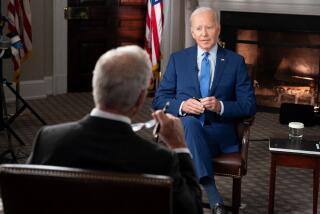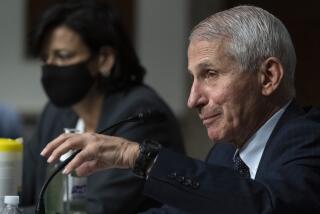Bush Wrong, Cancer Tied to Lifestyle, Experts Chide : Health: President puts himself at odds with medical opinion in comments about AIDS. But he agrees that exercise might help the heart.
By saying that cancer and heart disease are not illnesses rooted in personal lifestyle choices, President Bush put himself at odds with his own secretary of health and human services and the prevailing opinion in American medicine.
In comments Monday, Bush classified acquired immune deficiency syndrome as a disease that can be controlled by personal behavior. He went on to contrast AIDS with heart disease and cancer, but acknowledged that exercise might help the heart.
“I’m in favor of behavioral change,” Bush told a news conference in Kennebunkport, Me. “Here’s a disease where you can control its spread by your own personal behavior. You can’t do that in cancer--well, to some degree some might argue you can in heart disease if you run and stay fit.”
Experts in disease prevention said Tuesday that there is little difference between AIDS and other diseases when it comes to the benefits of healthy behavior, such as reducing fat intake, avoiding tobacco smoke or using a condom during sexual intercourse. Several expressed dismay that the President chose to set AIDS apart from cancer and heart disease.
“In order to make his point about AIDS, it seems like he felt he needed to make the erroneous point about the role of prevention in other diseases in our country,” said Dr. Russell V. Luepker, vice chairman of the American Heart Assn.’s Council on Epidemiology and Disease Prevention. “Many of the major cardiovascular diseases and cancer could be greatly reduced if we could get people to modify their behavior.”
Indeed, personal responsibility for disease prevention has been a major theme of U.S. Health and Human Services Secretary Louis W. Sullivan.
“The top 10 causes of death and disability in our society are conditions which are heavily influenced by personal behavior,” Sullivan said in an interview published last month.
As with AIDS, cures for most cancers and cardiovascular illness have proved elusive. Hence, prevention--through behavioral change--has received increasing emphasis.
“Much of your cancer risk you can alter by behavioral change,” said Dr. Brian E. Henderson, director of the Kenneth Norris Jr. Comprehensive Cancer Center at the University of Southern California. “About a third of all cancer is directly attributable to cigarette smoking.”
About 85% of all lung cancers--which killed 143,000 Americans last year--could be eliminated if people did not smoke, the American Cancer Society estimates.
Diet is another influential factor. Research has shown that excessive fat and salt intake adds greatly to a person’s risk of heart disease. And as many as a third of cancer deaths may be related to diets high in animal fat and calories.
AIDS organizations, meanwhile, criticized Bush for advocating behavioral change without adequate financial and policy support for AIDS preventive education.
“Education is the only tool we’ve got, but the U.S. government has yet to take AIDS education seriously,” Daniel T. Bross, executive director of the AIDS Action Council in Washington, D.C., said Tuesday.
More to Read
Get the L.A. Times Politics newsletter
Deeply reported insights into legislation, politics and policy from Sacramento, Washington and beyond. In your inbox three times per week.
You may occasionally receive promotional content from the Los Angeles Times.










